| Srl | Item |
| 1 |
ID:
181644
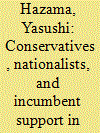

|
|
|
|
|
| Summary/Abstract |
To consolidate a predominant party system, an incumbent party will attempt to anchor voting behavior to social cleavages, a strategy called cleavage enclosure. However, does this strategy actually work? In Turkey, the incumbent AKP government has focused its campaigning on conservatives and nationalists. The analysis of the 2018 post-election survey reveals that the cleavage enclosure worked for conservatives but not for nationalists. Of the incumbent supporters in the previous election, conservatives replicated their support, whereas nationalists were less likely to support the incumbent than other identity holders. Nationalists tend to punish but not reward the incumbent party for its economic performance.
|
|
|
|
|
|
|
|
|
|
|
|
|
|
|
|
| 2 |
ID:
190812
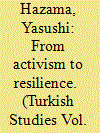

|
|
|
|
|
| Summary/Abstract |
This article discusses the behavior of the Constitutional Court in Turkey. As the highest court in the country, it is responsible for many decisions that have shaped the course of Turkish politics over the past six decades. It begins with a brief overview of the institutional features of the Turkish Constitutional Court. It then looks at major arguments on constitutional review, including judicial independence and court-curbing. Finally, it examines change and continuity in the attitudes of the Court based on the speeches of its presidents. One conclusion is that the Constitutional Court has transformed itself from that of the defender of the state principles to that of the defender of human rights while retaining its role with regard to the separation of powers. This transformation has been driven by both internal and external pressures: the domestic transition of tutelary democracy to competitive authoritarianism and the equivocation of domestic laws with international treaties.
|
|
|
|
|
|
|
|
|
|
|
|
|
|
|
|
| 3 |
ID:
137425
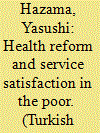

|
|
|
|
|
| Summary/Abstract |
Turkey began to reform its healthcare system in 2003 and introduced universal health insurance in 2008. This paper tests the effect of health reform in Turkey on satisfaction in the poor with public health services. An ordered logit model is applied to a pooled data set compiled from the Life Satisfaction Survey (N = 60,281) by the Turkish Statistical Institute during the period from 2003 to 2011. The results reveal that at the outset, the lowest 30 percent income group was less satisfied than the highest 70 percent income group, but this satisfaction gap dissipated after 2004 and never reappeared even during the post-reform period (2009–11).
|
|
|
|
|
|
|
|
|
|
|
|
|
|
|
|
| 4 |
ID:
152453
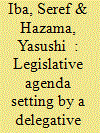

|
|
|
|
|
| Summary/Abstract |
This article examines the political motives and legislative consequences of Turkish omnibus bills that propose to amend a large number of disparate, unrelated laws. The quantitative analysis reveals, first, that the government uses omnibus bills to covertly change existing laws by attaching new articles to bills that are being deliberated. Second, undercover legislation backfires. The larger the number of current laws changed by an omnibus bill, the more likely those changes are to be annulled by the Constitutional Court. The legislative-efficiency objective behind omnibus bills is thus undermined by legal errors and deficiencies that result from a lack of parliamentary discussion.
|
|
|
|
|
|
|
|
|
|
|
|
|
|
|
|
| 5 |
ID:
132522
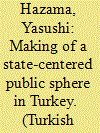

|
|
|
|
|
| Publication |
2014.
|
| Summary/Abstract |
Why has the state-centered recognition of the public sphere prevailed in Turkey over the last decade? A frame analysis of the public sphere discourse for 2002-09 reveals that the contingency of the discourse on the Islamic headscarf issue discouraged an essential understanding of the authentic public sphere. The dominant frame espoused by secularists claimed that the state banned headscarves in the public sphere were to preserve the neutrality of the public sphere. By contrast, pro-Islamists initially adopted an alternative counter-frame based on the Habermasian perspective, portraying the public sphere as tolerant of various ideas. Yet, in the face of stiff opposition from secularists, the pro-Islamists came to use a negative counter-frame with increasing frequency, implying that the state-centered public sphere impinged on the freedom to wear a headscarf. As a result, both the secularists' and pro-Islamists' frames helped entrench the recognition of the state-centered public sphere in Turkish society (Earlier and longer versions of this paper have appeared as IDE Discussion Paper Series No.262 (November 2010) and in Japanese in Ajiakeizai, Vol 52, No. 4 (April 2011)).
|
|
|
|
|
|
|
|
|
|
|
|
|
|
|
|